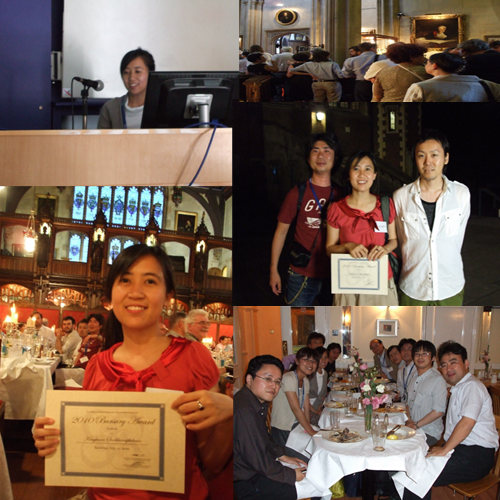1
2010年7月26日
DH2010
By Alejandro Toledo
Recently I participated in DH2010, the annual international conference for digital scholarship in the humanities, sponsored by the Alliance of Digital Humanities Organizations. DH2010 was hosted at King’s College London by the Centre for Computing in the Humanities and the Centre for e-Research, with the support of the School of Arts and Humanities, Information Services and Systems, and the Principal, Professor Rick Trainor. At DH2010, I participated in a paper session whose theme was Visual Art/Visualization, the chair Prof. Charles van den Heuvel, and my paper’s title Contexts, Narratives, and Interactive Visual Analysis of Names in the Japanese Hyohanki Diary. This paper was based on a previous research presented at DH2009 at the University of Maryland, US.
e-mail: alex[at]ice.ci.ritsumei.ac.jp
URL: http://www.ice.ci.ritsumei.ac.jp/~alex/
2010年7月22日
Digital Humanities 2010

By Kingkarn (Ploy) Sookhanaphibarn, Ph.D.
It is my pleasure to write about Digital Humanities 2010 during July 7-10, held at King’s College London, Strand Campus. Digital Humanities is the annual international conference for digital scholarship in the humanities, which was held at Maryland last year and will be held at Stanford USA next year. The conference had a variety of events not only academic but also social programs. The academic program started from six workshops two days before the conference, and then consisted of 36 parallel sessions and four poster sessions. The social programs are three reception parties and banquet, which all participants enjoyed musical performances and tasted English wines.
My talk was in the Visualization session on Friday 9th, where Prof. John Unsworth was the chairman. There were so many questions from audiences who were interested in my research topic. In the conference banquet, I was honored to receive the 2010 Bursary Award, for young researchers, from the Alliance of Digital Humanities Organizations. Therefore, I was very pleased to share my success with all members in the GCOE program. Lastly, I would like to thank you the GCOE program with all of you directly and indirectly giving me comments and suggestions in my research so that my research paper was qualified.
1
- 最近のエントリー
- KES IIMSS 2011 Best Research Paper Award
- DH 2011 at Stanford University USA
- DMDCM 2011 at Hangzhou China
- 2-months Visit at Institute for Media Innovation
- ACE2010@Taipei
- アーカイブ
- 2011年10月 [1]
- 2011年6月 [1]
- 2011年5月 [1]
- 2011年3月 [1]
- 2010年11月 [1]
- 2010年9月 [1]
- 2010年7月 [2]
- 2010年6月 [1]
- 2009年12月 [1]
- 2009年10月 [1]
- 2009年8月 [1]